| Listing 1 - 10 of 37 | << page >> |
Sort by
|

ISBN: 1840644907 Year: 2000 Publisher: Cheltenham Elgar
Abstract | Keywords | Export | Availability | Bookmark
 Loading...
Loading...Choose an application
- Reference Manager
- EndNote
- RefWorks (Direct export to RefWorks)
Book
ISBN: 9780415445696 0415445698 Year: 2009 Publisher: London Routledge
Abstract | Keywords | Export | Availability | Bookmark
 Loading...
Loading...Choose an application
- Reference Manager
- EndNote
- RefWorks (Direct export to RefWorks)
Book
ISBN: 1626373825 9781626373822 9781588267320 1588267326 Year: 2010 Publisher: Boulder : Lynne Rienner Publishers,
Abstract | Keywords | Export | Availability | Bookmark
 Loading...
Loading...Choose an application
- Reference Manager
- EndNote
- RefWorks (Direct export to RefWorks)
It is increasingly difficult to find developing countries whose leaders have not debated or implemented some type of decentralization reform. But has decentralization worked? Does it actually help a country to deepen democratic governance, promote economic development, or enhance public security? Under what conditions does it justify the enthusiasm of those who have pushed so successfully for its adoption? The authors of this volume sift through the accumulating evidence to assess how well decentralization has fared. Focusing on consequences rather than causes, their goal is to inform future interventions in support of decentralized governance by showcasing some of the important trade-offs that it has generated so far.

ISBN: 0754617122 Year: 2001 Publisher: Aldershot : Ashgate,
Abstract | Keywords | Export | Availability | Bookmark
 Loading...
Loading...Choose an application
- Reference Manager
- EndNote
- RefWorks (Direct export to RefWorks)
#SBIB:033.IO --- #SBIB:316.334.1O212 --- #SBIB:35H433 --- #SBIB:35H6080 --- Onderwijsbeleid: nationaal --- Beleidssectoren: onderwijs- en onderzoeksbeleid --- Bestuur en beleid: nationale en regionale studies: Ontwikkelingslanden --- Education, Higher --- College students --- Higher education --- Postsecondary education --- Universities and colleges --- Standards --- Evaluation --- Education
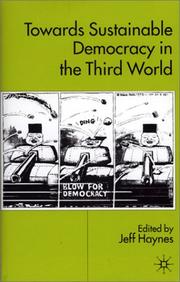
ISBN: 0333802500 Year: 2001 Publisher: Basingstoke Palgrave
Abstract | Keywords | Export | Availability | Bookmark
 Loading...
Loading...Choose an application
- Reference Manager
- EndNote
- RefWorks (Direct export to RefWorks)
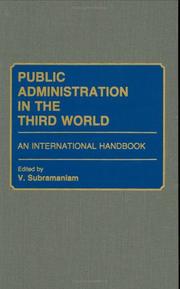
ISBN: 0313247307 Year: 1990 Publisher: London Greenwood
Abstract | Keywords | Export | Availability | Bookmark
 Loading...
Loading...Choose an application
- Reference Manager
- EndNote
- RefWorks (Direct export to RefWorks)
Public administration --- Developing countries --- Dependency --- #SBIB:032.IOS --- #SBIB:35H1127 --- #SBIB:35H6080 --- Center-periphery relations --- Core-periphery relations --- Dependent nations --- Bestuurlijke organisatie: centrale besturen: Ontwikkelingslanden --- Bestuur en beleid: nationale en regionale studies: Ontwikkelingslanden --- Politics and government. --- Colonies --- Imperialism
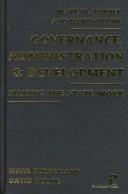
ISBN: 0333567536 9780333567524 9780333567531 Year: 1997 Publisher: Hampshire: MacMillan,
Abstract | Keywords | Export | Availability | Bookmark
 Loading...
Loading...Choose an application
- Reference Manager
- EndNote
- RefWorks (Direct export to RefWorks)
Government --- Public administration --- Economic policy and planning (general) --- Third World: economic development problems --- Developing countries --- Economic development --- Policy sciences --- #SBIB:35H6080 --- #SBIB:328H10 --- #SBIB:AANKOOP --- Bestuur en beleid: nationale en regionale studies: Ontwikkelingslanden --- Instellingen en beleid: algemeen / comparatief / derde wereldlanden --- Developing countries: economic development problems --- Economic development - Case studies --- Policy sciences - Case studies
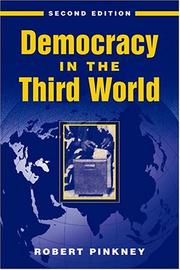
ISBN: 1555879977 1555879721 1685857256 Year: 2003 Publisher: Boulder Lynne Rienner
Abstract | Keywords | Export | Availability | Bookmark
 Loading...
Loading...Choose an application
- Reference Manager
- EndNote
- RefWorks (Direct export to RefWorks)
Political systems --- Developing countries --- Democracy --- Démocratie --- Pays en développement --- Politics and government. --- Politique et gouvernement --- #SBIB:324H20 --- #SBIB:327.4H60 --- Developing Countries --- #SBIB:35H6080 --- 841.1 Democratisering --- Politologie: theorieën (democratie, comparatieve studieën….) --- Derde wereld: ontwikkeling, sociale verandering: algemeen --- Bestuur en beleid: nationale en regionale studies: Ontwikkelingslanden --- Démocratie --- Pays en développement
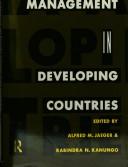
ISBN: 0415035058 9780415035057 Year: 1990 Publisher: London : Routledge,
Abstract | Keywords | Export | Availability | Bookmark
 Loading...
Loading...Choose an application
- Reference Manager
- EndNote
- RefWorks (Direct export to RefWorks)
Organization theory --- Developing countries --- Management --- Organizational behavior --- Gestion --- Comportement organisationnel --- #SBIB:35H6080 --- #SBIB:327.4H60 --- intercultureel management --- management, internationaal --- ontwikkelingslanden --- organisatieleer --- Bestuur en beleid: nationale en regionale studies: Ontwikkelingslanden --- Derde wereld: ontwikkeling, sociale verandering: algemeen --- Behavior in organizations --- Organization --- Psychology, Industrial --- Social psychology --- Administration --- Industrial relations --- Management - Developing countries. --- Organizational behavior - Developing countries.
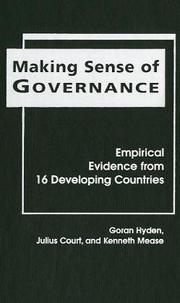
ISBN: 1588262677 9781588262677 1626373833 Year: 2004 Publisher: Boulder, Colorado : Lynne Rienner Publishers,
Abstract | Keywords | Export | Availability | Bookmark
 Loading...
Loading...Choose an application
- Reference Manager
- EndNote
- RefWorks (Direct export to RefWorks)
Although governance has been the focus of a considerable body of literature on democratic transitions and consolidation, data to support the claim that the concept is a useful one has been lacking. Now, however, Making Sense of Governance clearly shows the utility of research on governance, presenting empirical evidence from sixteen developing countries.The authors focus on six arenas: civil, political, and economic society and the executive, bureaucracy, and judiciary. Demonstrating conclusively for the first time that perceptions of governance by local stakeholders are realistic indicators of the nature and quality of a political regime, they also reveal the dynamic nature of governance and to what extent it correlates with socioeconomic variables.This comprehensive study is based on interviews in Argentina, Bulgaria, Chile, China, India, Indonesia, Jordan, Kyrgyzstan, Mongolia, Pakistan, Peru, Philippines, Russia, Tanzania, Thailand, and Togo.
Government --- Political systems --- Public administration --- Developing countries --- Comparative government --- Research. --- Politics and government. --- #SBIB:324H20 --- #SBIB:35H6080 --- Politologie: theorieën (democratie, comparatieve studieën….) --- Bestuur en beleid: nationale en regionale studies: Ontwikkelingslanden --- Comparative political systems --- Comparative politics --- Government, Comparative --- Political systems, Comparative --- Research --- Political science
| Listing 1 - 10 of 37 | << page >> |
Sort by
|

 Search
Search Feedback
Feedback About UniCat
About UniCat  Help
Help News
News